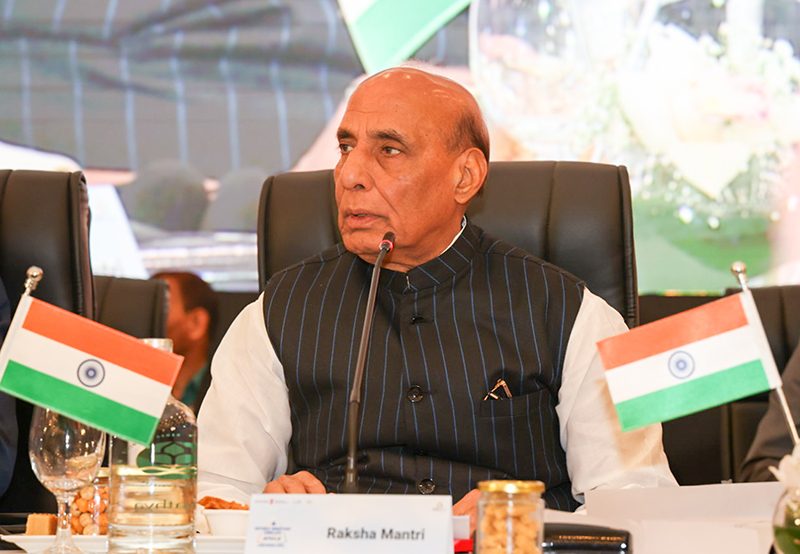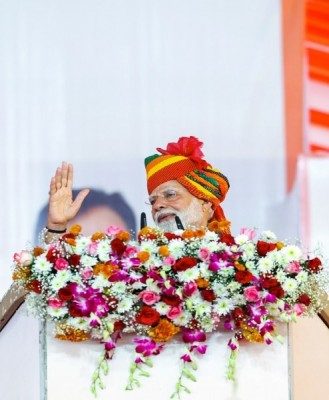 Rajnath Singh
Rajnath Singh
India stands for rules-based international order: Rajnath Singh at Aero India 2023
New Delhi: Indian Defence Minister Rajnath Singh hosted the Defence & Deputy Defence Ministers of 27 countries at the Defence Ministers’ Conclave held on the sidelines of Aero India 2023 in Bengaluru on Tuesday.
The broad theme of the conclave was ‘Shared Prosperity through Enhanced Engagements in Defence’ (SPEED). It sought to address aspects related to deepening cooperation for capacity building (through investments, R&D, joint ventures, co-development, co-production and provisioning of defence equipment), training, space, AI and maritime security to grow together.
In his inaugural address, the Raksha Mantri highlighted the need for greater cooperation in an increasingly-complex global security scenario.
He stated that the theme of the event ‘SPEED’ characterises the present era wherein geopolitical and security realities are shifting at hitherto unwitnessed speed.
He called for real-time collaboration to respond to such fast-paced changes.
Rajnath Singh was of the view that any major change in the domain of economy, security, health or climate has global reverberations and when peace and security of any region is threatened, the entire world feels its impact in multiple ways.
He pointed out that in an interconnected and networked world, the rapid transmission of shocks and disturbances makes it impossible to insulate one’s own country from the issues of other countries.
He emphasised on regular interactions during summits, conferences and conclaves to ensure that concerns of all are suitably addressed for a common, secure and prosperous future.
Singh reaffirmed India’s stand for a rules-based international order, in which “the primordial instinct of the might being right is replaced by the civilisational concept of fairness, cooperation, respect and equality amongst all sovereign nations”.
He asserted that untethered to any faction or alliance of one group of nations against another, India has worked ceaselessly for the upliftment of all nations, especially developing ones.
“India has always been open to new ideas from across the world, Commingling and contest of various thoughts has made us a global ideation centre. Our ancient ethos guides us to work not only towards cooperation for mutual benefit, but goes a welcome step further from a mere transactional approach to an edifying recognition of all humanity as one family,” Rajnath Singh said.
He referred to the global efforts to deal with COVID-19 and said the pandemic underscored the point that shared global prosperity requires greater coordination among all nations in diverse areas, of which defence and security is one of the most important.
Singh described collective security as sine qua non (essential condition) for development and prosperity.
He emphasised that terrorism, illegal arms trade, drugs smuggling, human trafficking, etc. pose significant security threats to the world.
He stressed on the need to devise new strategies to counter these threats.
“India does not believe in dealing with such security issues in the old paternalistic or the neo-colonial paradigms. We consider all nations as equal partners. That is why, we do not believe in imposing external or supra national solutions to a country's internal problems. We do not believe in giving sermons or cut-and-dried solutions, which do not respect the national values and constraints of the countries in need of assistance. Rather, we support the capacity building of our partner countries, so that they may chart out their own destiny, in accordance with their own genius,” he said.
Rajnath Singh added that there are nations which are richer, militarily or technologically more advanced than others, but it does not give them the right to dictate their solutions to the nations in need of support.
This top-down approach towards solving problems has never been sustainable in the long run and it often leads to debt trap, reaction from the local population, conflict and so on, he said.
He emphasised that the focus should be on providing assistance, in terms of building of institutions and capacities, so that bottom-up solutions can come up organically, in consonance with the ethos of the nations being assisted.
Singh informed the Defence Ministers that India is moving ahead working with this principle by offering enhanced defence partnership to its friendly countries.
“We offer a partnership that is accommodative of the national priorities and capacities. We want to build with you, we want to launch with you, we want to create with you and we want to develop with you. We wish to create symbiotic relationships, where we can learn from each other, grow together and create a win-win situation for all,” he said, reiterating the Government’s endeavour to transcend hierarchical relationship of buyer and seller to a codevelopment and co-production model.
Rajnath Singh exuded confidence that through Aero India, the Defence Ministers would have gained knowledge about the robust defence manufacturing ecosystem being created in India.
He urged them to share their requirements and expectations through enquiries, comments & feedback, which will provide the industry a significant learning opportunity.
Over 160 delegates from several countries, including Defence & Deputy Defence Ministers from 27 countries, 15 Defence and Service Chiefs and 12 Permanent Secretaries from 80 countries participated in the conclave attesting to India’s tremendous growth and engagement in the defence and security sectors.
Support Our Journalism
We cannot do without you.. your contribution supports unbiased journalism
IBNS is not driven by any ism- not wokeism, not racism, not skewed secularism, not hyper right-wing or left liberal ideals, nor by any hardline religious beliefs or hyper nationalism. We want to serve you good old objective news, as they are. We do not judge or preach. We let people decide for themselves. We only try to present factual and well-sourced news.







